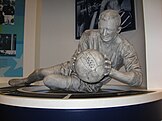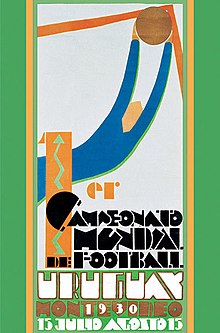Portal:Association football
| Main page | Categories & Topics | WikiProjects & Things you can do |
The Association football portal
Association football, more commonly known as football or soccer, is a team sport played between two teams of 11 players each, who almost exclusively use their feet to propel a ball around a rectangular field called a pitch. The objective of the game is to score more goals than the opposing team by moving the ball beyond the goal line into a rectangular-framed goal defended by the opposing team. Traditionally, the game has been played over two 45-minute halves, for a total match time of 90 minutes. With an estimated 250 million players active in over 200 countries and territories, it is the world's most popular sport.
The game of association football is played in accordance with the Laws of the Game, a set of rules that has been in effect since 1863 and maintained by the IFAB since 1886. The game is played with a football that is 68–70 cm (27–28 in) in circumference. The two teams compete to score goals by getting the ball into the other team's goal (between the posts, under the bar, and fully across the goal line). When the ball is in play, the players mainly use their feet, but may also use any other part of their body, such as their head, chest and thighs, except for their hands or arms, to control, strike, or pass the ball. Only the goalkeepers may use their hands and arms, and that only within the penalty area. The team that has scored more goals at the end of the game is the winner. There are situations where a goal can be disallowed, such as an offside call or a foul in the build-up to the goal. Depending on the format of the competition, an equal number of goals scored may result in a draw being declared, or the game goes into extra time or a penalty shoot-out.
Internationally, association football is governed by FIFA. Under FIFA, there are six continental confederations: AFC, CAF, CONCACAF, CONMEBOL, OFC, and UEFA. Of these confederations, CONMEBOL is the oldest one, being founded in 1916. National associations (e.g. The FA in England) are responsible for managing the game in their own countries both professionally and at an amateur level, and coordinating competitions in accordance with the Laws of the Game. The most prestigious senior international competitions are the FIFA World Cup and the FIFA Women's World Cup. The men's World Cup is the most-viewed sporting event in the world, surpassing the Olympic Games. The two most prestigious competitions in club football are the UEFA Champions League and the UEFA Women's Champions League, which attract an extensive television audience worldwide. The final of the men's tournament is the most-watched annual sporting event in the world. (Full article...)
Selected article
It was originally built in 1913 on the site of a local college's recreation ground and has been significantly redeveloped twice. The first came in the 1930s from which the still-existing Art Deco East and West Stands date; the second in the late 1980s and early 1990s following the Taylor Report, during which the terraces at both ends of the pitch were removed, making it all-seater with four stands. The resulting reduction in capacity and matchday revenue eventually led to Arsenal deciding to build the Emirates Stadium nearby, which they moved to in 2006.
Its presence also led to the local Tube station being renamed to "Arsenal" in 1932, making it the only station on the network to be named after a football club. (Full article...)
Selected biography
Named FWA Footballer of the Year for 1956, Trautmann entered football folklore with his performance in the 1956 FA (Football Association) Cup Final. With 15 minutes of the match remaining Trautmann suffered a serious injury after diving at the feet of Birmingham City's Peter Murphy. Despite his injury he continued to play, making crucial saves to preserve his team's 3–1 lead. His neck was noticeably crooked as he collected his winners' medal; three days later an X-ray revealed it to be broken.
Trautmann continued to play for Manchester City until 1964, making 545 appearances. In 2004 he was appointed an honorary Officer of the Order of the British Empire (OBE) for promoting Anglo-German understanding through football. (Full article...)
Selected association

The Oceania Football Confederation (OFC) is one of the six continental confederations of international association football. The OFC has 13 members, 11 of which are full members and two which are associate members not affiliated with FIFA. It promotes the game in Oceania and allows the member nations to qualify for the FIFA World Cup.
OFC is predominantly made up of island nations where association football is not the most popular sport, with low GDP and low population meaning very little money is generated by the OFC nations. The OFC has little influence in the wider football world, either in terms of international competition or as a source of players for high-profile club competitions. OFC is the only confederation to have not had at least one international title, the best result being Australia making the final of the 1997 FIFA Confederations Cup. (Full article...)
Did you know (auto-generated) -

- ... that Welsh footballer Jon Morgan went on to become a college principal after retiring?
- ... that Ryan Roberts, a defensive end for Notre Dame, was a soccer player in high school?
- ... that Ecuadorian footballer Hernán Galíndez won a bicycle for beating a team featuring Lionel Messi when they were children?
- ... that after his soccer career, Steve Palacios enlisted in the United States Army and played for the United States Armed Forces soccer team?
- ... that goalkeeper Sophie Whitehouse, who has lived in England, Africa and the US, has been chosen to play soccer for the Republic of Ireland?
- ... that Carlton Town F.C., now competing at the eighth tier of the English football pyramid, was once denied promotion by a hat-trick scored by future England international Jamie Vardy?
Selected image
Selected quote
General images -
Selected World Cup
The 1930 FIFA World Cup was the inaugural FIFA World Cup, the world championship for men's national football teams. It took place in Uruguay from 13 to 30 July 1930. FIFA, football's international governing body, selected Uruguay as the host nation, as the country would be celebrating the centenary of its first constitution and the Uruguay national football team had successfully retained their football title at the 1928 Summer Olympics. All matches were played in the Uruguayan capital, Montevideo, the majority at the purpose built Estadio Centenario.
Thirteen teams (seven from South America, four from Europe, and two from North America) entered the tournament. Only a handful of European teams chose to participate because of the difficulty of traveling to South America due to the Great Depression. The teams were divided into four groups, with the winner of each group progressing to the semi-finals. The first two World Cup matches took place simultaneously and were won by France and the United States, who defeated Mexico 4–1 and Belgium 3–0, respectively. Lucien Laurent of France scored the first goal in World Cup history, while United States goalkeeper Jimmy Douglas posted the first clean sheet in the tournament the same day. (Full article...)
Selected topic
More did you know -
- ... that the 2020 EFL League Two play-off Final is believed to be the first competitive match played behind closed doors at Wembley Stadium? (13 January 2021)
- ... that the 2010 Football League Two play-off Final at Wembley Stadium was won by "a pub team from Essex"? (25 February 2021)
- ... that after his side won the 2008 Football League One play-off Final, Doncaster Rovers manager Sean O'Driscoll said he could "murder a cup of tea"? (9 February 2021)
- ... that, during his time in a Japanese prisoner-of-war camp, footballer Ernie Curtis would obtain extra food by teaching his captors how to play with a ball made of paper? (27 March 2021)
- ... that Port Vale F.C. captain Tom Conlon's grandfather's father-in-law played for the club more than a century ago? (9 April 2021)
- ... that when Fred Stewart was appointed the manager of Cardiff City F.C., he paid the transfer fee of his first signing himself? (30 March 2021)
Association football portals
More sports portals
Associated Wikimedia
The following Wikimedia Foundation sister projects provide more on this subject:
-
Commons
Free media repository -
Wikibooks
Free textbooks and manuals -
Wikidata
Free knowledge base -
Wikinews
Free-content news -
Wikiquote
Collection of quotations -
Wikisource
Free-content library -
Wikiversity
Free learning tools -
Wiktionary
Dictionary and thesaurus























































